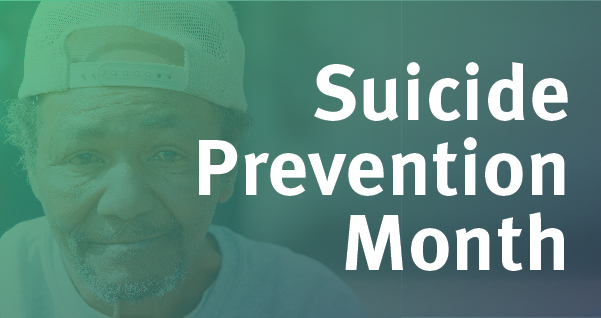
Each year, we recognize September as Suicide Prevention Month. It’s an opportunity to spread awareness for the staggering statistics around suicide and what can be done to help those who are struggling with their mental health. At Volunteers of America, we know our nation’s veterans often face many challenges when returning from service, including unemployment, poor mental health, physical injuries, and the need for safe, secure housing. If these difficulties go unaddressed, their mental health challenges can worsen.
According to the Department of Veterans Affairs’ National Veteran Suicide Prevention Annual Report (2019), veterans account for 13.5% of all suicide deaths in the country, with over 6,000 veterans dying by suicide each year. The suicide rate among veterans is 1.5 times higher than the non-veteran population ages 18 and up.
That’s why Volunteers of America Ohio & Indiana is working with the U.S. Department of Veterans Affairs (VA) to prevent veteran suicide in our communities.
We recently received funding from VA to support our mission through the Staff Sergeant Parker Gordon Fox Suicide Prevention Grant Program (SSG Fox SPGP), a three-year program that provides funding to community-based organizations with innovative ideas for preventing veteran suicide. SSG Fox SPGP honors veteran Parker Gordon Fox, who joined the Army in 2014 and was a sniper instructor at the U.S. Army Infantry School at Fort Benning, Georgia. He was known for his generosity and kindness to others in need. Fox died by suicide on July 21, 2020, at the age of 25.
With the SSG Fox SPGP award, Volunteers of America will provide more intensive case management to support veterans and their families in Ohio and Indiana. This grant will also allow us to expand our reach within the community and work closely with local partners to better connect veterans to the services they need to rebuild their lives.
In recognition of Suicide Prevention Month, we’re sharing VA’s recommended approach to help you act with care and compassion if you encounter a veteran who is in crisis or experiencing suicidal thoughts. Use the acronym “S.A.V.E.” to help you remember the important steps involved in suicide prevention.
Signs of suicidal thinking should be recognized: There are behaviors that may be signs a veteran needs support. Learn to recognize these warning signs:
- Hopelessness, feeling like there is no way out
- Anxiety, agitation, sleeplessness or mood swings
- Feeling like there is no reason to live
- Rage or anger
- Engaging in risky activities without thinking
- Increasing alcohol or drug use
- Withdrawing from family and friends
If you notice these signs, seek help immediately:
- When asked, they express a desire to hurt or kill themselves
- When prompted, they reveal that they are looking for ways to kill themselves
- They talk about death, dying, or suicide
- They begin to exhibit self-destructive behavior, such as increased drug or alcohol use, talking about acquiring/using weapons for self-harm, and stockpiling medication
Ask the most important question of all – Are you thinking of killing yourself?
There are behaviors that may be signs a Veteran needs support. Know how to ask the most important question of all:
- “Are you thinking of killing yourself?
Other ways to ask the question include:
- “Are you thinking of suicide?”
- “Have you had thoughts about taking your own life?”
When asking the question, remember:
- DO ask the question if you’ve identified warning signs or symptoms
- DO ask the question in such a way that is natural and flows with the conversation
- DO NOT ask the question as though you are looking for a “no” answer (“You’re not thinking of killing yourself, are you?”)
- DO NOT wait to ask the question until he or she is halfway out the door
Validate the Veteran’s experience
As you listen to the veteran, ask him or her to do the talking and use supportive, encouraging comments. Use the following steps to let the veteran know that you are listening and acknowledge his or her experience.
- Talk openly about suicide – Be willing to listen and allow the Veteran to express his or her feelings
- Recognize the situation is serious
- Do not pass judgement
- Reassure them that help is available
Encourage treatment and expedite getting help
If a veteran is having suicidal thoughts, remain calm and reassure them that help is available.
- DO NOT keep the veteran’s suicidal behavior a secret
- DO NOT leave him or her alone
- Try to get the person to seek immediate help from his or her doctor or the nearest hospital or emergency room, OR Call 911.
- You can also call the confidential Veterans Crisis Line at 988 and Press 1.
Veterans served our country to keep us safe. Now, it’s our turn to protect them.
For more suicide prevention resources, visit: https://www.mentalhealth.va.gov/suicide_prevention/index.asp
For more information about the Staff Sergeant Parker Gordon Fox Suicide Prevention Grant Program (SSG Fox SPGP), visit: https://www.mentalhealth.va.gov/ssgfox-grants/
